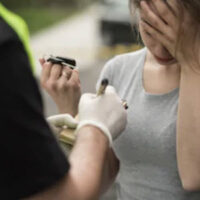Why You Should Avoid Taking A Field Sobriety Test

When an officer suspects you might be driving intoxicated and pulls you over they will likely ask you to take a field sobriety test. Defense attorneys have limited prosecutors to calling such “tests” exercises while in front of juries so as not to confuse juries as to the real value of the officers observations as there is no grade or pass fail value. Unfortunately, it is possible to “fail” a sobriety test even if you are sober as the decision is solely that of the officer who has already pulled you over and forced you out of your car. The decision has most likely already been made and the officer is merely gathering evidence for the prosecutor. The consequences are that you may be providing evidence that can be twisted and used against you to make your defense more difficult even if the results of the breathalyzer results are later determined to be good.
The Three Test That Make Up the Standardized Field Sobriety Test (SFST)
When an officer asks you to take a field sobriety test, there are actually multiple “indicators” the officer is observing.
The first is a horizontal gaze nystagmus (HGN) test. During this test the officer will move an object such as their finger or a pen from left to right and have you track it with your eyes. The officer is looking to see jerking in your eye movement, particularly at angles less than 45 degrees. As we look more peripherally, everyone’s eyes are more likely to show involuntary jerking, even when they are completely sober. This test is not often admissible in Court and most law enforcement officers are not certified in the test and misuse, misread and fail to conduct the test within the bounds of the science.
The second area the officers are observing is your ability to walk, talk, and generally perform the normal functions of life. The officer will look at your speech pattern, the coloring of your skin, the appearance of your eyes and the smell from your clothes and breathe. Additionally, the officer will be observing your general appearance and dress along with your ability to respond to requests such as producing your driving license, registration and insurance.
Once these observations are made, the officer will ask you to perform the tasks associated with the SFST. These tasks include:
- Walk and Turn
- One Leg Stand
- Head Tilt back while Standing Still.
- Head Tilt and Nose Touch
The Officer is looking for your to perform the tasks to THEIR satisfaction. This is difficult as the officer has already made up his mind that you are probably impaired even before requesting the exercises as that is the REASON he has asked you to perform the tasks. He will look for swaying, balance issues and general coordination.
Finally, the officer is looking at your ability to follow his instructions. There are multiple parts to the instructions that can number over 10 depending on the tasks. You will not have time to practice, questions by you can be used against you. Requests to repeat instructions can be used against you. The system is built for you to fail and for the officer to build a case for the prosecutors.
What Can Go Wrong During an SFST?
By the time an officer decides to perform the SFST with a driver they are assuming there is a good likelihood that the driver has a blood-alcohol level above .08. This simple bias will influence how they grade the test, which is already subjective in nature. According to Verywell Mind, the accuracy of the HGN test by itself is only 77 percent, (that is even if the officer performs it correctly and is certified to perform the test) while the other tests are even more inaccurate in predicting a drunk driver. Even if a person is sober they can struggle with the SFST because of injuries, age, a disability, or other medical condition.
If You Have Been Pulled Over For Drunk Driving, Contact a Port St. Lucie Lawyer
There is no law in Florida requiring you take a sobriety field test and we recommend that you decline to take one if you are pulled over by the police. Instead, ask to speak with a qualified DUI and DWI attorney who can advise you on your rights and next steps to take. If you have been pulled over, contact the Port St. Lucie DUI attorneys at Baginski Brandt & Brandt today at 772-466-0707 to schedule a free consultation.
Resources:
mentalfloss.com/article/12557/why-does-alcohol-cause-spins
verywellmind.com/field-sobriety-test-67159
